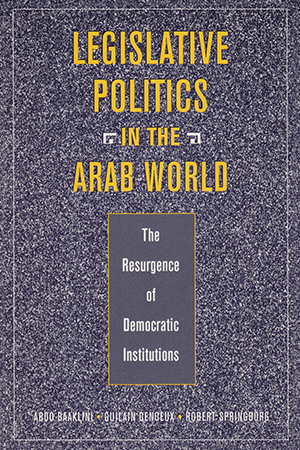The vitality and significance of parliaments in the Arab world is one of the essential—but overlooked—stories of political life in the 1990s. Baaklini, Denoeux, and Springborg present the first comprehensive, comparative analysis of modern Arab legislatures.
Drawing on their extensive experience as both scholars and project consultants, the authors Yemen). Their work is of critical importance not only to an understanding of Middle East politics and society, but also for all those interested in the institutionalization of democratic practices.
The late Abdo Baaklini was professor in the Nelson A. Rockefeller College of Public Affairs and Policy, State University of New York at Albany. Guilain Denoeux is associate professor of government and director of the International Studies Program at Colby College. Robert Springborg is director of the London Middle East Institute at the University of London.
"Thorough and analytical, Legislative Politics in the Arab World is an important contribution to the study of electoral and legislative politics in Lebanon, Morocco, Jordan, Kuwait, Yemen, and Egypt.... Middle East specialists and policymakers will greatly benefit from reading this timely book."—Farid el Khazen, MESA Bulletin
"A long-overdue and important step toward understanding legislative institutions in the Arab world.... provides a wealth of information for students of Middle Eastern politics generally, legislative institutions, and political liberalization.—Ellen Lust-Okar, International Journal of Middle Eastern Studies
"A welcome addition that adds considerably to our knowledge of the institutional dynamics at work in the transition to democratic rule in the Arab world.... the book meets [its] objectives with unqualified success... provides invaluable and in many instances original data.... Legislative Politics in the Arab World is a book of profound importance, both for its theoretical contribution to the institutional dynamics of democratization and for the rich empirical data it presents on the legislatures of Lebanon, Morocco, Jordan, Kuwait, Yemen, ad Egypt."—Mehran Kamrava, American Political Science Review
"[A] timely and original book.... Through case studies of six Arab states, the authors analyze the renewal of parliamentary politics and examine the causes and policy implications of the strengthening of parliaments in many Arab countries in the 1990s."—Choice
"Legislatures in Arab countries have too often been dismissed as little more than rubber stamps for dictators.... This well-crafted study shows a more complex reality, with Arab legislatures becoming an important arena in which real politics—both contention and compromise—take place."—William B. Quandt








